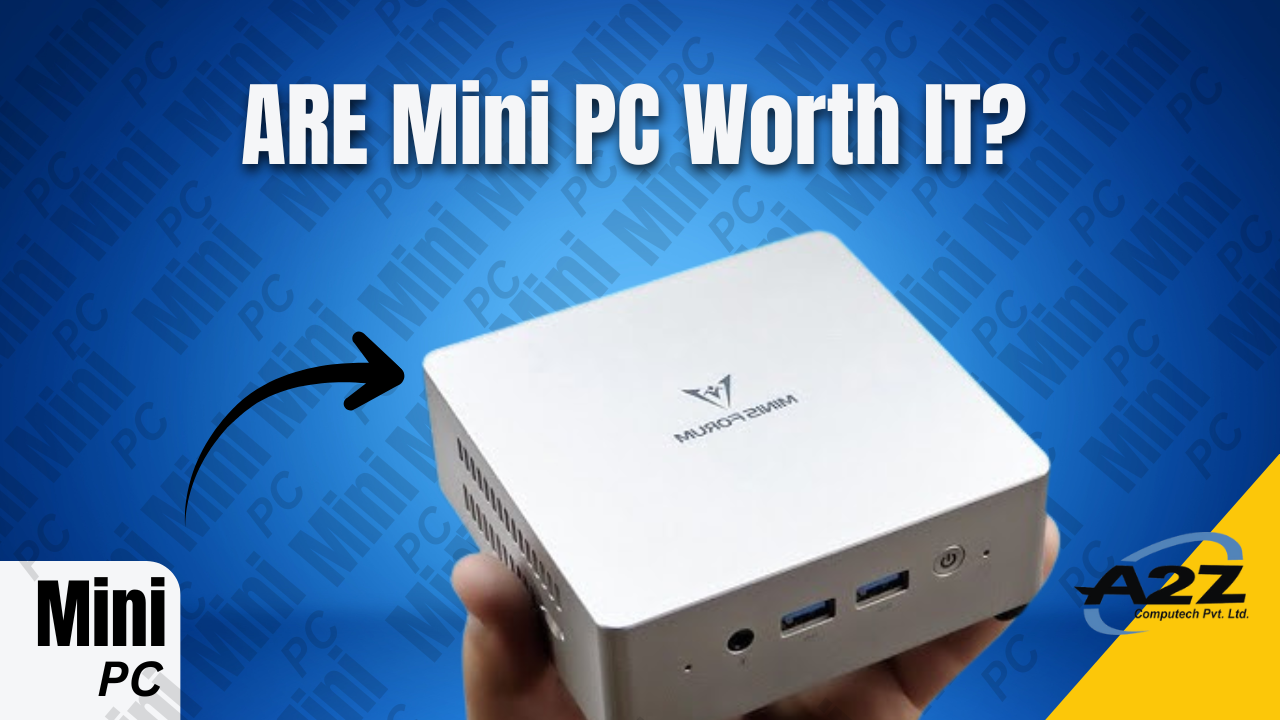Technology is shrinking — literally. In 2025, mini PCs have become a hot trend among students, professionals, and even gamers who want compact, energy-efficient systems. But the big question is: Are mini PCs really worth it? Or should you stick to a traditional desktop or laptop?
At A2Z Computech, we’ve seen a rise in demand for mini PCs, and in this blog, we’ll break down their pros, cons, and who should buy one in 2025.
✅ Advantages of Mini PCs
1. Compact & Space-Saving
Mini PCs are perfect for small desks or minimalist setups. Some models can even be mounted behind a monitor, making them nearly invisible.
Example: A student in a hostel room can use a mini PC like the Geekom Mini IT12 for studies, entertainment, and light gaming — without cluttering their desk.
2. Energy Efficient & Quiet
Mini PCs consume less power than traditional desktops, which means lower electricity bills. Many models also run silently during normal tasks.
Example: An office using 10–15 mini PCs can cut down monthly electricity costs significantly compared to full-size desktops.
3. Great for Everyday Work & Entertainment
For browsing, video calls, streaming, and office work, mini PCs are more than enough. Some newer models with integrated GPUs can even handle casual gaming.
Example: A professional who needs MS Office, Zoom calls, and Netflix streaming can rely on a mini PC like the Geekom IT15 AI without performance issues.
4. Portability & Flexibility
Unlike bulky desktops, mini PCs are easy to move. You can carry them between home and office or even travel with them.
Example: A freelancer can keep one mini PC at home and easily take it to co-working spaces when needed.
⚠️ Limitations of Mini PCs
1. Limited Upgrade Options
Most mini PCs don’t allow major upgrades. RAM and storage may be replaceable, but CPUs and GPUs are usually fixed.
Example: Unlike a gaming tower where you can swap in a new graphics card, mini PCs restrict future upgrades.
2. Thermal & Performance Constraints
Because of their size, cooling systems are smaller. Heavy workloads like 4K video editing or high-end gaming can cause overheating and throttling.
Example: Running Cyberpunk 2077 on ultra settings? A mini PC won’t match a gaming desktop with RTX 4070.
3. Fewer Ports & Connectivity
Limited space means fewer USB ports, display outputs, and expansion slots. You may need extra hubs or docks.
Example: A content creator with multiple external drives and dual monitors may find connectivity limiting.
4. Price vs Performance
Compact design often comes at a higher cost. For the same money, you might get a more powerful full-sized desktop.
Example: A ₹60,000 mini PC may perform like a ₹45,000 desktop build.
🔍 Who Should Buy a Mini PC in 2025?
Mini PCs are worth it if you:
- Need a compact, clutter-free setup
- Work on light-to-moderate tasks (browsing, office, streaming)
- Value portability and energy efficiency
- Don’t plan to upgrade hardware frequently
Mini PCs are not ideal if you:
- Play AAA games at high settings
- Do heavy video editing or 3D rendering
- Want to future-proof with regular upgrades
- Need multiple ports and expansion options
✅ Conclusion
So, are mini PCs worth it in 2025? Yes — if your needs match what they do best. They’re space-saving, efficient, and perfect for students, professionals, and home setups. But for hardcore gaming or heavy workloads, a traditional PC or laptop still wins.
At A2Z Computech, we offer a wide range of mini PCs and full desktop solutions. Whether you need a compact study machine, a business PC, or a gaming powerhouse, we’ll help you choose the right one for 2025 and beyond.
👉 Visit A2Z Computech today and build your dream setup — big or small.

